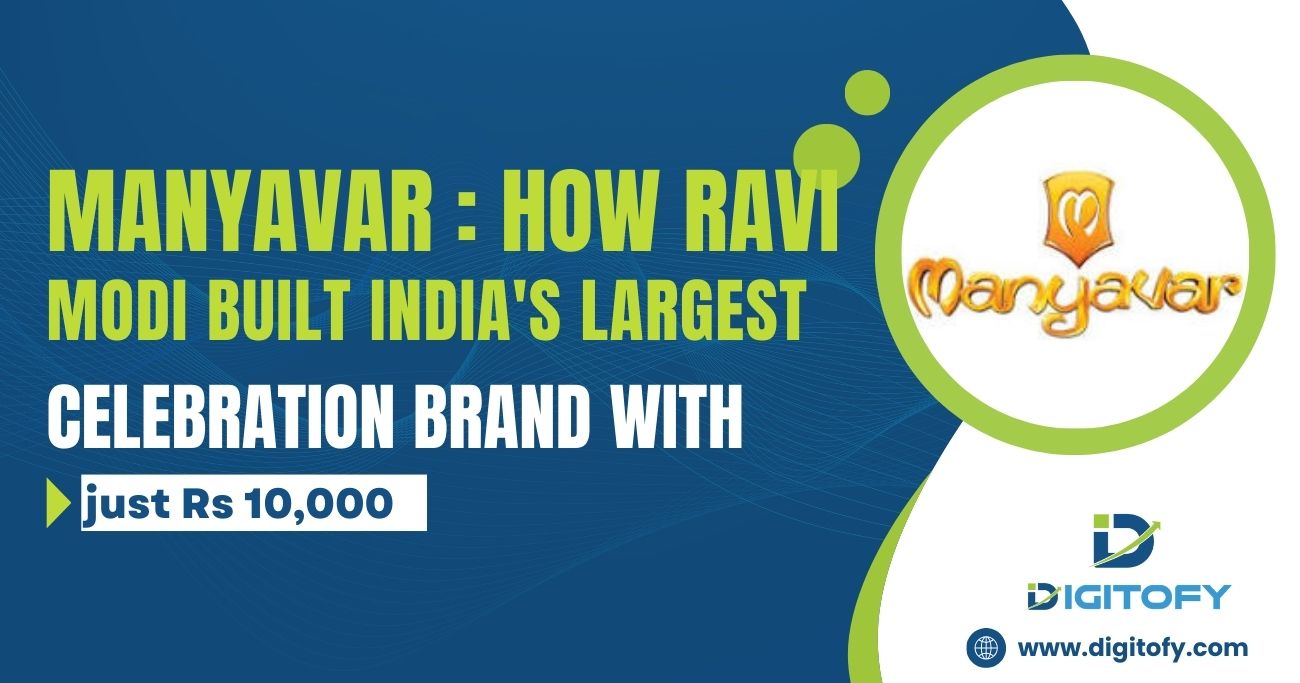Crafting Success: Manyavar’s Marketing Masterplan
Crafting Success: Manyavar’s Marketing Masterplan
Manyavar is a leading Indian ethnic wear brand that has carved out a unique position for traditional clothing in the vibrant but competitive market. Founded in 1999, Manyavar has grown to become a household name across India, celebrated for its innovative designs, high-quality craftsmanship, and savvy marketing strategies.
About Manyavar
Manyavar was launched in Kolkata in 1999 by Vedji Aggarwal and his son Ravi Aggarwal, drawing on their family’s long legacy in the Indian textiles sector. They saw an opportunity to organize the highly fragmented, unbranded market for ethnic occasion wear for Indian men. The company emphasizes creativity in its designs and upholds rich Indian traditions and crafts heritage. Manyavar aims to fuse new interpretations of style with age-old textile art forms.
Over two decades, Manyavar has expanded to over 500 stores across 200 cities in India and overseas. It has also moved into womenswear, childrenswear, and accessories while cementing the popularity of its opulent men’s sherwanis. Manyavar has raised funding from private equity investors, including Kedaara Capital, for its marketing and retail expansion.
What’s New at Manyavar?
Recent years have seen a ramping up of Manyavar’s ambitions with new product categories, store openings, and marketing outreach. Some highlights include:
- Flagship ‘Manyavar Gaurav’ stores offering custom-made clothing
- New sub-brands Manyavar Mehfil and Twamev launching fusion-wear lines
- E-commerce website and shopping apps to tap the online market
- High-profile celebrity endorsements from top stars like Ranveer Singh
Buyer Personas
Manyavar targets multiple segments of Indian ethnic clothing buyers:
Premium Segment
- Upper middle-class and affluent consumers aged 25-50
- Purchase clothing for weddings, festivals, parties
- Value fine materials and intricate embroidery
- Seek a balance of traditional yet modern styles
- Willing to pay higher prices for quality
Value Segment
- Middle-class consumers on tighter budgets
- Purchase for occasional family functions
- Prioritize affordability with decent styling
- Aspire to own premium manyavar pieces
Marketing Mix
Manyavar deploys well-researched strategies across the marketing mix:
Product Strategy
- New collections every two weeks to drive excitement
- Limited stocks of each design to encourage urgency
- Men’s sherwanis as a flagship product, now expanding to full wardrobes
Pricing Strategy
- Premium pricing is driven by product quality and branding
- Regular price hikes accepted by customers as brand value grows
- ‘No discounts’ policy to avoid brand dilution
Place Strategy
- Flagship stores in high-visibility locations
- Shop-in-shops in multi-brand outlets across India
- Leveraging e-commerce to reach Tier 2 and 3 cities
Promotions Strategy
- Heavy investment in TV, print, and digital advertising
- Celebrities and influencers used to expand appeal
- Major campaigns focused on crucial festival seasons
- Loyalty program providing exclusive offers and rewards
Competitor Analysis
Manyavar operates in an ethnic wear market that is heavily fragmented, with both organized national players and a long tail of regional brands and sellers. Its main competitors include:
Sai
Silks Sai Silks is a regional ethnic wear brand in Tamil Nadu that has become popular across South India. It is best known for its range of pure silk saris that draw female customers looking for traditional clothing crafted from fine materials. Over its three-decade history, Sai Silks has expanded into other product lines like churidar suits, kurtis, dress materials, and menswear, including dhotis, shirts, and veshtis. With 70+ stores across Tamil Nadu, Karnataka, Andhra Pradesh, and Telangana, Sai Silks competes with Manyavar in South Indian markets.
Biba
Founded in 1988 and headquartered in New Delhi, Biba Apparels is among India’s fastest-growing ethnic wear brands. Unlike Manyavar, Biba targets more youthful and contemporary sensibilities with its fusion wear drawing inspiration from Indian and Western styles and global runway trends. This fast-fashion positioning focuses on up-to-date styling, readily accessible retail outlets, and lower prices, making Biba products affordable for middle-class buyers. With 300+ stores and wide e-commerce distribution, Biba has emerged as Manyavar’s closest competitor at the national level.
Abu Jani Sandeep Khosla
At the ultra-premium end of luxury Indian fashion sits Abu Jani and Sandeep Khosla. The designer duo label was founded in 1988, garnering global fame for its extravagant designs drawn from Mughal and medieval aesthetics. Catering to ultra-HNIs, film stars, and billionaire industrialists, the brand retails couture pieces that cost several lakhs for custom creations featuring intricate hand embroidery and decadent fabrics. Abu Sandeep, as the brand is often called, serves as an aspirational compass for Manyavar’s top-tier custom offerings.
By competing with brands across price points and product positioning yet focusing on ethnic occasion wear, Manyavar has adroitly carved out a sizeable middle ground in the Indian clothing market.
Manya var’s Marketing Strategies
Product Strategy
Manyavar extensively uses data analytics to predict regional preferences and upcoming styles. It produces small batches of new designs weekly to fuel customer excitement. By avoiding mass production, Manyavar creates exclusivity around its latest collections.
Pricing
By refusing discounts and training salespeople to educate customers, Manyavar has conditioned buyers to accept premium prices for the brand’s tangible quality and intangible luxury factors. Regular price increases have not dented demand, validating Manyavar’s pricing power.
Promotions
Working with Bollywood stars like Ranveer Singh, Manyavar captures celebrity glamour to raise its brand profile nationally. Campaigns are focused on India’s busy wedding and festival seasons, tapping periods of peak demand for ethnic clothing purchases.
The no-discounts policy works with promotions that never market Manyavar products as being on sale. This combination allows the brand to push the intrinsic value of its apparel rather than rely on promotions that can erode perceived worth.
Unique Success Factors
No Discounts
The zero-discount approach goes totally against the usual retail playbook but works brilliantly for Manyavar. It has conditioned customers to recognize the brand’s value and quality attributes rather than just responding to markdown promotions. This preserves profit margins and strengthens Manyavar’s premium luxury positioning in customers’ minds.
Localized Design and Inventory
Manyavar studies data on regional preferences, upcoming celebrations, and festivities to tweak designs and inventory specifically for each locality. This highly localized strategy means products flying off shelves during peak wedding and festival demand surges.
Strong Quality Proposition
Customers pay Manyavar’s higher prices primarily due to tangible product attributes – rich fabrics, fine craftsmanship, and intricate embroideries. This focus on genuine quality materials and construction gives the brand credibility that outshines
Bottom Line
Through savvy marketing built on a foundation of high quality craftsmanship, Manyavar has become a household name in Indian ethnic wear. Its success proves that in a traditional market, forward thinking about design, customer analysis, promotions and brand building can transform a small player into a national leader. By tapping into Indian’s twin desires for wearing heritage fashions yet with contemporary styling for special occasions, Manyavar has carved out an enviable position across multiple consumer segments.

.webp)

